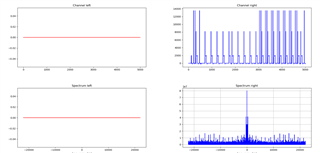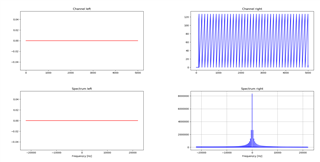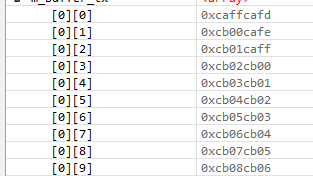Hello,
I´m working on my audio project and I try to stream some audio data (currently a 1 kHz square wave signal with 3.3 V peak) over I2S. The audio signal is sampled by an ADC in the free-running mode.
#include "app_error.h"
#include "nrf_drv_ppi.h"
#include "nrf_drv_i2s.h"
#include "nrf_drv_saadc.h"
#include "nrf_drv_timer.h"
#include "nrf_gpio.h"
#include "nrf_log.h"
#include "nrf_log_ctrl.h"
#include "nrf_log_default_backends.h"
#define LED_0 17
#define BUTTON_0 13
#define BUTTON_1 14
#define TRIGGER 31
#define SAMPLES 128
static bool IsStarted = false;
static volatile uint32_t* I2S_BlockToFill = NULL;
static volatile uint32_t* ADC_BlockToFill = NULL;
static uint32_t I2S_Buffer[2][SAMPLES];
static nrf_saadc_value_t ADC_Buffer[2][SAMPLES];
static nrf_ppi_channel_t PPI_Channel;
static const nrf_drv_timer_t Timer = NRF_DRV_TIMER_INSTANCE(0);
void on_Timer_Handler(nrf_timer_event_t EventType, void* p_Context)
{
}
void on_SAADC_Handler(nrf_drv_saadc_evt_t const* p_Event)
{
if(p_Event->type == NRF_DRV_SAADC_EVT_DONE)
{
APP_ERROR_CHECK(nrf_drv_saadc_buffer_convert(p_Event->data.done.p_buffer, SAMPLES));
ADC_BlockToFill = (uint32_t*)p_Event->data.done.p_buffer;
}
}
static void DataHandler(nrf_drv_i2s_buffers_t const* p_Released, uint32_t Status)
{
// 'nrf_drv_i2s_next_buffers_set' is called directly from the handler
// each time next buffers are requested, so data corruption is not
// expected.
ASSERT(p_Released);
// When the handler is called after the transfer has been stopped
// (no next buffers are needed, only the used buffers are to be
// released), there is nothing to do.
if(!(Status & NRFX_I2S_STATUS_NEXT_BUFFERS_NEEDED))
{
return;
}
// First call of this handler occurs right after the transfer is started.
// No data has been transferred yet at this point, so there is nothing to
// check. Only the buffers for the next part of the transfer should be
// provided.
if(!p_Released->p_tx_buffer)
{
nrf_drv_i2s_buffers_t const NextBuffer = {
.p_tx_buffer = I2S_Buffer[1],
.p_rx_buffer = NULL,
};
APP_ERROR_CHECK(nrf_drv_i2s_next_buffers_set(&NextBuffer));
nrf_gpio_pin_clear(TRIGGER);
I2S_BlockToFill = I2S_Buffer[1];
}
else
{
// The driver has just finished accessing the buffers pointed by
// 'p_Released'. They can be used for the next part of the transfer
// that will be scheduled now.
APP_ERROR_CHECK(nrf_drv_i2s_next_buffers_set(p_Released));
// The pointer needs to be typecasted here, so that it is possible to
// modify the content it is pointing to (it is marked in the structure
// as pointing to constant data because the driver is not supposed to
// modify the provided data).
I2S_BlockToFill = (uint32_t*)p_Released->p_tx_buffer;
}
}
void SAADC_Init(void)
{
APP_ERROR_CHECK(nrf_drv_saadc_init(NULL, on_SAADC_Handler));
APP_ERROR_CHECK(nrf_drv_ppi_init());
nrf_drv_timer_config_t timer_cfg = NRF_DRV_TIMER_DEFAULT_CONFIG;
timer_cfg.bit_width = NRF_TIMER_BIT_WIDTH_32;
APP_ERROR_CHECK(nrf_drv_timer_init(&Timer, &timer_cfg, on_Timer_Handler));
nrf_drv_timer_extended_compare(&Timer, NRF_TIMER_CC_CHANNEL0, nrf_drv_timer_us_to_ticks(&Timer, 23), NRF_TIMER_SHORT_COMPARE0_CLEAR_MASK, false);
nrf_drv_timer_enable(&Timer);
APP_ERROR_CHECK(nrf_drv_ppi_channel_alloc(&PPI_Channel));
APP_ERROR_CHECK(nrf_drv_ppi_channel_assign(PPI_Channel, nrf_drv_timer_compare_event_address_get(&Timer, NRF_TIMER_CC_CHANNEL0), nrf_drv_saadc_sample_task_get()));
nrf_saadc_channel_config_t Channel0 = NRF_DRV_SAADC_DEFAULT_CHANNEL_CONFIG_SE(NRF_SAADC_INPUT_AIN1);
Channel0.acq_time = NRF_SAADC_ACQTIME_10US;
APP_ERROR_CHECK(nrf_drv_saadc_channel_init(0, &Channel0));
APP_ERROR_CHECK(nrf_drv_saadc_buffer_convert(ADC_Buffer[0], SAMPLES));
APP_ERROR_CHECK(nrf_drv_saadc_buffer_convert(ADC_Buffer[1], SAMPLES));
APP_ERROR_CHECK(nrf_drv_ppi_channel_enable(PPI_Channel));
}
int main(void)
{
APP_ERROR_CHECK(NRF_LOG_INIT(NULL));
NRF_LOG_DEFAULT_BACKENDS_INIT();
SAADC_Init();
nrf_gpio_cfg_input(BUTTON_0, NRF_GPIO_PIN_PULLUP);
nrf_gpio_cfg_input(BUTTON_1, NRF_GPIO_PIN_PULLUP);
nrf_gpio_cfg_output(TRIGGER);
nrf_gpio_cfg_output(LED_0);
nrf_gpio_pin_clear(TRIGGER);
nrf_gpio_pin_set(LED_0);
nrf_drv_i2s_config_t I2S_Config = NRF_DRV_I2S_DEFAULT_CONFIG;
I2S_Config.sdin_pin = NRFX_I2S_PIN_NOT_USED;
I2S_Config.sdout_pin = 27;
I2S_Config.lrck_pin = 26;
I2S_Config.sck_pin = 25;
I2S_Config.mck_pin = 2;
I2S_Config.mck_setup = NRF_I2S_MCK_32MDIV8;
I2S_Config.ratio = NRF_I2S_RATIO_96X;
I2S_Config.channels = NRF_I2S_CHANNELS_STEREO;
APP_ERROR_CHECK(nrf_drv_i2s_init(&I2S_Config, DataHandler));
nrf_drv_i2s_buffers_t const InitialBuffer = {
.p_tx_buffer = I2S_Buffer[0],
.p_rx_buffer = NULL,
};
while(1)
{
if(nrf_gpio_pin_read(BUTTON_0) == false)
{
if(IsStarted == false)
{
APP_ERROR_CHECK(nrf_drv_i2s_start(&InitialBuffer, SAMPLES, 0));
NRF_LOG_INFO("I2S sender started...");
IsStarted = true;
nrf_gpio_pin_set(TRIGGER);
nrf_gpio_pin_clear(LED_0);
}
}
else if(nrf_gpio_pin_read(BUTTON_1) == false)
{
if(IsStarted)
{
nrf_drv_i2s_stop();
NRF_LOG_INFO("I2S sender stopped...");
IsStarted = false;
nrf_gpio_pin_clear(TRIGGER);
nrf_gpio_pin_set(LED_0);
}
}
if(I2S_BlockToFill && ADC_BlockToFill)
{
for(uint32_t i = 0x00; i < SAMPLES; i++)
{
//int16_t Sample = (int16_t)(32768 * sin(2.0 * 3.14 * (double)i / ((double)SAMPLES)));
I2S_BlockToFill[i] = (uint32_t)(0x0000 | (ADC_BlockToFill[i] & 0xFFFF));
}
I2S_BlockToFill = NULL;
ADC_BlockToFill = NULL;
}
if(NRF_LOG_PROCESS())
{
NRF_LOG_FLUSH();
}
}
}
The code from above will give a pretty poor signal when I use the ADC.

I have tried to figure out the reason for this and replaced the line
I2S_BlockToFill[i] = (uint32_t)(0x0000 | (ADC_BlockToFill[i] & 0xFFFF));
with
I2S_BlockToFill[i] = (uint32_t)(0x0000 | (i & 0xFFFF));
to produce data from a ramp signal and the signal looks much better.

So it looks like the problem is based on the ADC. I have tried to use two buffers to use the same swapping buffer system as in the I2S example.
How can I improve this result?


